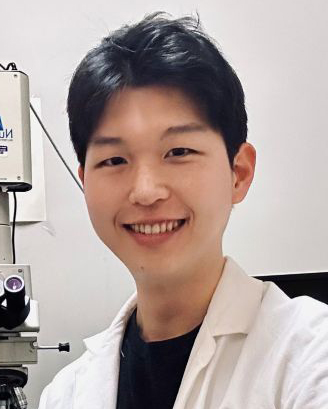Each month, the editors of three of the American Society for Pharmacology and Experimental Therapeutic’s (ASPET) journals choose who they call their Highlighted Trainee Authors. These early-career scientists are recognized for their innovative research published in The Journal of Pharmacology and Experimental Therapeutics, Drug Metabolism and Disposition, and Molecular Pharmacology. This feature showcases selected young scientists, demonstrates what drives them and reveals why pharmacology is important to them. This month we are featuring the February 2025 Highlighted Trainee Authors.

Anthony Garcia
Anthony Garcia is a 6th year PhD candidate in the Department of Pharmacology at the University of Michigan. As a first-generation college student, Garcia finds inspiration from his parents. His mom, a natural problem solver, taught him resilience; and his dad, who aspired to be a teacher, reinforced the value of education. As a child, during a visit to a bookstore, he picked up a book about Albert Einstein that was full of complex equations. Fascinated by symbols like psi and omega, he was determined to understand them and to learn more about science. Throughout the years and as he progressed with his education, Garcia periodically revisited the book, driven by his curiosity and desire to learn—qualities he considers vital for a scientist.
As an undergraduate at the University of New Mexico, he pursued medicine, engaging in the relevant extracurricular activities and courses. But it was his first organic chemistry course with Dr. Lisa Whalen that unexpectedly captivated him. “Organic chemistry opened the door to understanding the molecular basis of disease, and that fascinated me. I realized that research was something that I was interested in,” said Garcia.
He also credits the mentors he’s worked with throughout his academic career—Dr. Maggie Werner-Washburne, Dr. Eva Chi, Dr. Jimmy Rae, and Dr. Yoichi Osawa—for providing guidance and mentorship on what it means to be a good research scientist and pharmacologist.
Describing the basis of his research, Garcia explains, “There are few treatment options for neurodegenerative diseases, which are widely thought to be caused by formation and accumulation of toxic misfolded proteins. Treatments for these disorders often only provide symptomatic relief. As such, there is a need to identify strategies that will promote the degradation of these toxic misfolded proteins.” He hopes that his research will be helpful in further dissecting the role of protein chaperones, especially Hsp70, as a potential therapeutic target for protein misfolding diseases. “Our research provides a new way to identify more compounds that target Hsp70 and promote the disposal of misfolded proteins,” he explained.
Garcia aspires to be a pharmacologist in the pharmaceutical industry where he can continue to develop his research skills and contribute to the development of novel therapies and impact on human health.
When asked what it means to have his research published in Molecular Pharmacology, Garcia said, “To have been accepted to such a rigorous and prestigious journal such as Molecular Pharmacology is an incredible honor. I am grateful to everyone who worked on this project with me, as I could not have done it without them, and I am proud of the work we completed. It is extremely rewarding to share these findings with the scientific community.”



Asna Latif
“I have always aspired to be a life-long learner and sought a career that could give me the opportunity to fulfill this desire. While my interests were always in biology, I was more specifically able to cultivate a passion for molecular biology,” said Asna Latif, a PhD candidate at the University of Alberta.
Once she started doing research as an undergraduate student, it was hard to stop, especially after seeing the impact that one’s work can have. “At the crossroads of choosing a career path, research presented me with the unique challenge of asking my own questions and carving a path for innovation,” Latif said.
Her research addresses the role of pharmacogenomics in cancer therapy, specifically the development of hearing loss due to cisplatin treatment. “By being able to test what kind of genetic pattern a patient has, we may be able to better predict their likelihood of developing hearing loss from cisplatin treatment and make more informed decisions about treatment options,” Latif explained.
Latif hopes that through this work, she and her research team have contributed to justifying the importance of an individual’s genetic makeup in their responses to drugs and identified ways in which therapy options can be improved by implementing other diagnostic tools that may be able to predict toxicity to cisplatin chemotherapy.
For Latif, being published in the February issue of The Journal of Pharmacology and Experimental Therapeutics means a great deal. “Seeing the hard work that my colleagues and I have put into our research be recognized in a journal as reputable as ASPET is deeply gratifying. I am honored to be a part of this community.”



Joe Lim
Joe Lim, a PhD candidate in Environmental Toxicology at the University of Washington, has always been drawn to research, and how scientists think about a problem and generate and test hypothesis. “I especially liked the aspect that the findings have the potential to help people and can be used for the greater good. This thought process has been one of the key drivers of my motivation for research and made my graduate school career very fulfilling,” Lim said.
His research focuses on the liver and the interactions of its various cell types and their specialized tasks that make up the liver’s overall function.
“The degree to which each cell type is capable to metabolize drugs has not been extensively characterized. We hope our findings will aid in further understanding the mechanisms of chemical-induced liver injury with improved resolution and precision,” explained Lim.
For Lim, one of the most exciting parts of his research is that there are so many unknowns that can be figured out. He hopes that the pharmacological and toxicological mechanisms of action in metabolic organs, as well as our basic understanding of how cell types in metabolic organs specialize in will help lead to positive outcomes to benefit people.
Joe’s future career and research plans include continuing his scientific career and investigating how various xenobiotics impact the metabolic capabilities, components, and interactions in organs, such as the liver and intestines. Additionally, he hopes to unveil mechanisms of action for toxicity and therapeutics to better understand how certain therapeutics at the given amount function and how certain chemicals cause toxic effects.
When asked about having his work published in Drug and Metabolism Disposition, Lim shares that, “The ASPET scientific community meets high scientific standards with great recognition. I appreciate that my research contributes to advancing pharmacology and therapeutics.”
